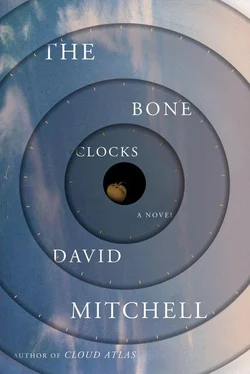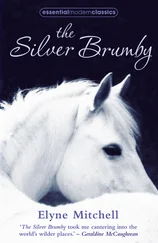“This specimen is closer to a hundred days old,” the proprietor removes his delicate glasses to rub a watery eye, “than a hundred years.”
The customer pinches the air like a comedy Italian: “What about the faded dye? The browned paper? That paper’s not contemporary!”
“Period paper isn’t hard to obtain — although the crosshatch fibers suggest the 1920s more than the 1890s.” Bernard Kriebel’s unhurried English has a Slavonic burr: He’s Yugoslav, I happen to know. “Dunking the paper in weak tea is an old gambit. The blocks must have taken many a night to craft, I’ll admit — though with a list price of twenty-five thousand pounds, the prize justifies the labor. The ink itself is modern — Windsor and Newton Burnt Sienna? — diluted, slightly. Not an inept forgery.”
Appalled falsetto huff: “You accuse me of forgery ?”
“I accused someone, not you. Interestingly.”
“You’re trying to beat the price down. Admit it.”
Kriebel grimaces with distaste. “A part-timer at Portobello may bite, or one of the traveling stamp and coin fairs. Now, if you’d excuse me, Mr. Budd, a genuine customer is waiting.”
Mr. Budd snarls a gaaagh and storms out. He tries to slam the door — but it’s not slammable — and he’s gone. Kriebel shakes his head at the ways of the world.
I ask, “Do many forgers bring you their handiwork?”
Kriebel sucks in his cheeks to show he’ll ignore the question. “I know your face …” he searches for me in his mental Rolodex, “… Mr. Anyder. You sold me a Pitcairn Island set of eight in August. A good clean set.”
“I hope you’re well, Mr. Kriebel.”
“Passably. How are your studies? Law at UCL, wasn’t it?”
I think he’s trying to catch me out. “Astrophysics at Imperial.”
“So it was. And have you found any sentient life up there?”
“At least as much as there is down here, Mr. Kriebel.”
He smiles at the old joke and looks at my satchel. “Are you buying or selling this afternoon?”
I bring out the black folder and remove a strip of four stamps.
A Biro in Kriebel’s hand goes tap-tap-tap on the benchtop.
The philatelist and his Anglepoise lamp peer closer.
The Biro falls silent. Bernard Kriebel’s old eyes look my way inquisitorially, so I recite: “Four Indian Half-Anna Deep Blues; 1854 or 1855; from the right of sheet, with part marginal inscription; fresh condition; unused. How am I doing so far?”
“Well enough.” He renews his inspection under a Sherlock-sized magnifying glass. “I won’t pretend that a plethora of these pass through my hands. Did you have any … price in mind?”
“A single franked specimen sold at Sotheby’s last June for two thousand one hundred pounds. Times four, gives us eight thousand four hundred. Add fifty percent for the pristine set, and we’re in the neighborhood of thirteen grand. However. You have Central London overheads, you pay on the nail, and I have high hopes for a long-term relationship, Mr. Kriebel.”
“Oh, I think we are on ‘Bernard’ terms from now on.”
“Then call me Marcus, and my price is ten thousand.”
Kriebel’s already decided to accept, but pretends to agonize out of courtesy: “Commonwealth stamps are underperforming at present.” He lights his pipe and the aria ends. “The highest I can go is eight and a half, alas.”
“It’s an icy day for chasing me to Trafalgar Square, Bernard.”
He sighs through hairy nostrils. “My wife will pull me limb from limb for my softness, but young philatelists should be encouraged. We can agree to split the difference: nine thousand two hundred and fifty?”
“Ten is a simpler, rounder number.” I put on my scarf.
A final sigh. “Ten it is.” We shake. “You’ll take a check?”
“Yes, but, Bernard …” he turns in the doorway to his cubbyhole, “… would you let your sweet Half-Annas out of sight prior to getting your hands on the payment?”
Bernard Kriebel tilts his head at my professionalism. He returns my stamps and goes to prepare my check. A terminally ill bus hauls itself up Charing Cross Road. Demons drag Don Giovanni down into the underworld: The fate of all amateurs who neglect their homework.
I WEAVE THROUGH Christmassy Soho, blaring, steamy, and hazardous with icy slush, cross the glacial stampede of traffic on Regent Street, and arrive at Suisse Integrité Banc’s discreet London office, tucked away behind Berkeley Square. Security Ape holds the bulletproof door open with a nod of recognition; I have an appointment. Once within its airy, mahogany and cream interior, I deposit my check with the petite female teller across the polished desk, who asks no questions beyond, “How are you today, Mr. Anyder?” There’s a little Swiss flag by her computer terminal, and as she fills out my deposit slip, I wonder if Madam Constantin, as a Swiss expatriate of understated means, ever graces this same plush chair. That odd encounter in King’s College Chapel keeps returning to me, even if I’ve experienced no more time-slips. “Until next time, Mr. Anyder,” the teller says, and I agree, Yes, until next time. The money is only the side product of my art, but I still leave feeling armed and flak-jacketed; when Kriebel’s check clears, my account will cross the fifty K mark. This is, of course, a tadpole-sized account for Integrité’s sheets, but it’s a tidy enough stash for an undergraduate paying his own way in the world. And it will multiply. Half of my fellow Humberites — unless their parents are good and willing milkers — are so up to their nostrils in debt and denial that for their first five working years they’ll have to take whatever shit gets flung their way and act like it’s caviar. Not I. I’ll throw it back. Harder.
IN A SHELTERED walkway off Piccadilly Circus, two men in suits and raincoats are blocking off a doorway and haranguing someone, hidden from view. The bright windows of Tower Records shine out through the feeble sleet, and early commuters are pouring into Piccadilly Circus Tube, but my curiosity is piqued. Between the men’s backs I glimpse a shrunken Yeti huddled in an entrance. “Nice business strategy you’ve got worked out,” says one. “You watch people buy flowers there and collar them for money here so they can’t walk off without feeling like callous bastards.” The tormentor sounds drunk. “We’re in marketing, too, see. So what’s your hit rate?”
“I”—the Yeti’s blinking and scared—“I don’t hit no one.”
The tormentors laugh in each other’s face: not a nice sound.
“All — all I’m askin’ for’s a bit of change. The hostel’s thirteen quid a night.”
“Then get yourself a shave and get a job stacking shelves!”
“Nobody’ll give me a job without I’ve got a perm’nent address.”
“Get a permanent address, then. Duh .”
“Nobody’ll rent me a room without I’ve got a job.”
“This one’s got excuses for everything, hasn’t he, Gaz?”
“Hey. Hey. Want a job? I’ll give you a job. Want it?”
The burliest one leans down: “My colleague’s asking you very nicely if you want a job.”
The Yeti swallows and nods. “What’s the job?”
“Hear that, Gaz? Beggars can be choosers, after all.”
“Money collector,” says Gaz. “Ten quid a minute, guaranteed.”
The Yeti has a facial tic. “What do I have to do?”
“The clue’s in the job title.” The guy turns and lobs a pocketful of coins into a gap in the traffic roaring into Piccadilly Circus. “Collect the fucking money, Einstein!” Coins roll between tires and under cars, scattering in ruts of dirty ice. “Look at that, the streets of London are paved with gold.” The two tormentors shuffle off, delighted with themselves, leaving the shrunken Yeti calculating the odds of picking up coins without getting whacked by a bus. “Don’t,” I tell the homeless guy.
Читать дальше












